Table of Contents
Twizzlers, a popular brand of licorice candy, is manufactured by The Hershey Company, a well-known American confectionery company.
The Hershey Company, founded by Milton S. Hershey in 1894, has a storied history deeply rooted in the world of chocolate and candy. Starting with chocolate-coated caramels, Milton Hershey built a sprawling chocolate factory in Hershey, Pennsylvania, in 1900. This factory became the heart of a town that he named after himself.
The Hershey Company quickly gained recognition with its iconic Hershey Chocolate Bar. Beyond its chocolate products, Hershey expanded its portfolio by acquiring brands like Reese’s Peanut Butter Cups in 1963 and York Peppermint Patties. Over the years, Hershey continued to grow and diversify, becoming a global leader in the confectionery industry. Today, The Hershey Company is celebrated for its extensive range of beloved brands, including Hershey’s, Reese’s, Kit Kat, Twizzlers, and more.
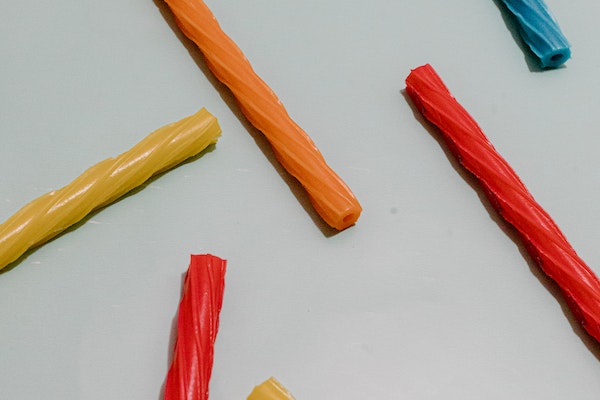
Are Twizzlers Halal in USA?
TWIZZLER products are not halal certified.
In our ongoing efforts to ensure that the products we consume align with halal dietary guidelines, we took the initiative to contact the manufacturer directly. We communicated our concerns and inquiries regarding the halal status of their products, specifically Twizzlers, a popular candy item. Through our correspondence, we explicitly requested that the manufacturer provide clarity on whether their products hold a halal certification or comply with halal dietary requirements.
The manufacturer’s response to our inquiry was received, and it is with transparency that we share their reply. In their response, the manufacturer indicated that their products, including Twizzlers, do not bear a halal certification. This means that as of the time of our inquiry, Twizzlers and similar products from this particular manufacturer have not been officially recognized as halal-compliant.
We have attached the email correspondence to this statement, allowing our community to access the direct communication with the manufacturer. It’s important to note that the absence of a halal certification or an official declaration of halal status by the manufacturer creates a somewhat gray area for consumers who adhere to halal dietary guidelines. Without a clear halal certification, we cannot provide a definitive directive regarding the consumption of these products according to halal standards.
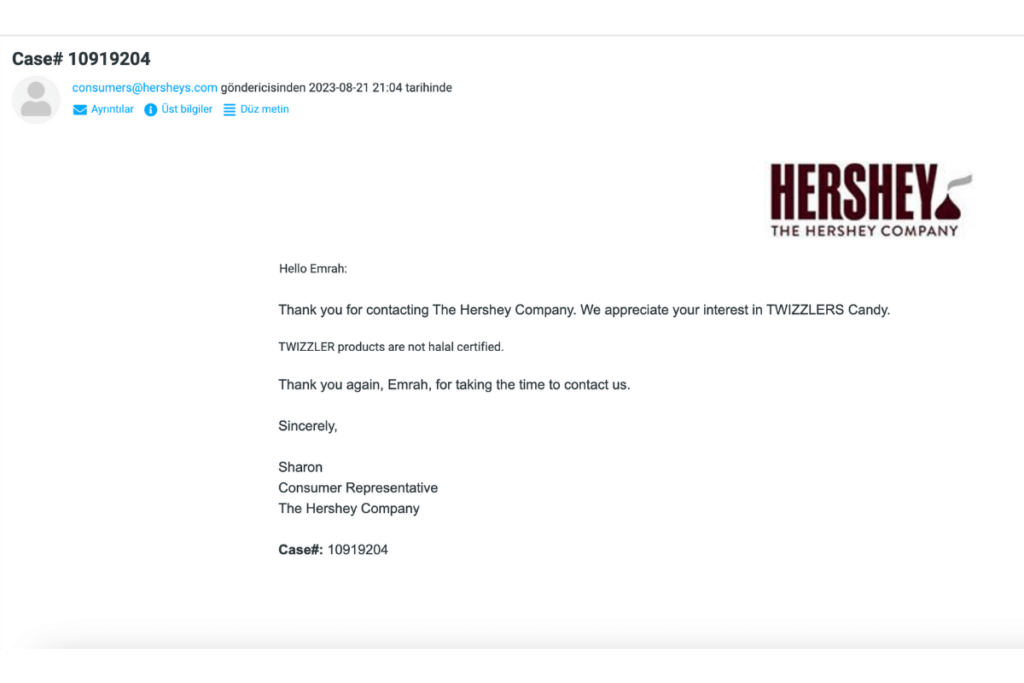
However, we encourage our Muslim community members, who value halal dietary practices, to reach out to the manufacturer independently and express their interest in having these products certified as halal. Consumer feedback and demand can play a pivotal role in influencing companies to pursue halal certification for their products. To facilitate this, we have provided a link to the manufacturer’s contact page (https://www.thehersheycompany.com/en_us/home/contact-us.html), where consumers can reach out directly to the company to voice their concerns and requests.
However, we encourage our Muslim community members, who value halal dietary practices, to reach out to the manufacturer independently and express their interest in having these products certified as halal.
In conclusion, while we have taken the initiative to inquire about the halal status of Twizzlers from the manufacturer, it is essential to emphasize that the absence of a halal certification or a firm declaration from the manufacturer makes it challenging to provide a definitive halal endorsement for these products.
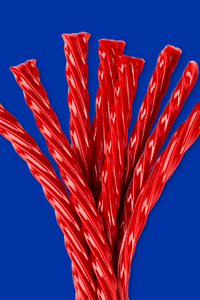
We respect our community’s commitment to halal dietary choices and encourage individual engagement with the manufacturer to express the importance of obtaining halal certification for these products, ultimately contributing to the availability of more halal-compliant options in the market.
Are Twizzlers Vegan?
Twizzlers, a popular licorice candy, are generally considered suitable for a vegan diet. If we closely examine the ingredients listed on the packaging, we find that there are no direct animal-derived components, such as gelatin or dairy products, present in Twizzlers. This is good news for vegans who are cautious about avoiding ingredients of animal origin.
However, it’s essential to be aware that while Twizzlers themselves don’t contain animal-based ingredients, they are still processed foods that may involve various additives, some of which could be of concern to vegans. For instance, Twizzlers contain artificial colors, including Red 40, and other synthetic components. While these additives aren’t animal-derived, some vegans prefer to avoid products with certain artificial colorings or additives for health or ethical reasons. So, while Twizzlers may generally align with a vegan diet, it’s always a good practice to review ingredient lists and consider personal preferences when making food choices.
Twizzlers: Licorice Option
Twizzlers are licorice. They are a type of twisted, chewy candy that is often referred to as “licorice twists.” However, it’s important to note that Twizzlers typically have a different flavor and texture compared to traditional black licorice candy. Twizzlers come in various flavors, with strawberry being one of the most popular, and they have a fruity and chewy consistency. So, while they fall under the broad category of licorice candy, they have their distinct characteristics that set them apart from traditional black licorice.
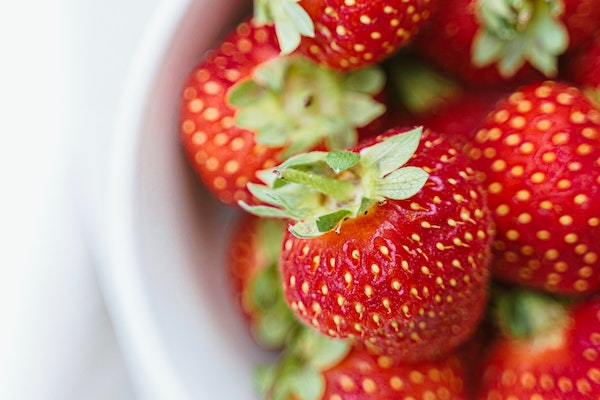
Kosher Status of Twizzlers
Twizzlers offers a range of kosher-certified products, providing a sweet treat option for those who adhere to kosher dietary guidelines. The certification is a testament to their commitment to meeting the requirements of Jewish dietary laws. Twizzlers candy products are carefully reviewed and certified by reputable kosher certification agencies, ensuring that the ingredients and manufacturing processes adhere to kosher standards.
When you pick up a pack of Twizzlers candy with a kosher symbol or certification on the packaging, you can enjoy these fruity twists with the confidence that they align with kosher dietary regulations. It’s worth noting that kosher certification may vary among different Twizzlers products, so always check the specific packaging for the kosher symbol to confirm its compliance with your dietary preferences.
Are Twizzlers Healthy?
It’s no secret that candy isn’t the healthiest choice for snacking, and Twizzlers are no exception. When you look at a serving size of six Twizzlers, you’ll find they contain 18 grams of sugar, 95 milligrams of sodium, 36 grams of carbohydrates, and 0.5 grams of fat. Since Twizzlers are not as sweet as some other candies, people often consume more than one serving, compounding the sugar intake, which is concerning due to its potential to cause inflammation in the body and contribute to various health issues.*
Excessive sugar consumption is known to be a significant factor in the rise of obesity and other health problems. Dentists are not fans of Twizzlers either because their stickiness makes them prone to cling to teeth, potentially leading to dental issues.
Another concern is the presence of Red dye #40, an artificial color commonly found in candies, foods, and beverages. Research has linked this dye to hyperactivity, Attention Deficit Disorder (ADD), Attention Deficit Hyperactivity Disorder (ADHD), allergic reactions, and mood swings, and it’s classified as a carcinogen.*
The “artificial flavoring” listed in Twizzlers’ ingredients is somewhat ambiguous, lacking specific information about the components. Generally, artificial flavorings are lab-created chemicals designed to mimic specific tastes, like strawberry, and are mixed with other ingredients to create the desired flavor. In the case of Twizzlers, there are no actual crushed strawberries involved; it’s all about “pretend strawberries.”
On a positive note, Twizzlers are processed in a facility free from peanuts and tree nut products, which is a relief for those with allergies to these substances. However, it’s essential to remember that, like many candies, Twizzlers should be enjoyed sparingly as an occasional treat rather than a daily snack.
If you’re looking for a healthier snack option, it’s advisable to choose fruits, vegetables, or whole grains that provide essential nutrients and fiber without the excessive sugars found in candies like Twizzlers.
Twizzlers are a popular candy known for their fruity flavors and chewy texture, but they are not typically considered a healthy snack. These candy twists are primarily made from sugar and corn syrup, which provide little nutritional value and can contribute to weight gain and dental issues when consumed in excess.
While Twizzlers are low in fat, they are high in sugar, and excessive sugar consumption can lead to various health problems, including obesity, diabetes, and heart disease. Additionally, they do not offer any significant vitamins, minerals, or other essential nutrients that promote overall health.
If you’re looking for a healthier snack option, it’s advisable to choose fruits, vegetables, or whole grains that provide essential nutrients and fiber without the excessive sugars found in candies like Twizzlers. Enjoying Twizzlers occasionally as a treat is fine, but they should be consumed in moderation as part of a balanced diet for better overall health.
Do Twizzlers Have Gelatin?
Twizzlers do not contain gelatin, making them a suitable choice for individuals who adhere to dietary restrictions or have ethical concerns related to gelatin consumption. Gelatin is a common ingredient in many gummy candies and marshmallows, but it is not used in Twizzlers. These iconic licorice twists are primarily made from ingredients like corn syrup, enriched wheat flour, sugar, cornstarch, and various flavorings. Their chewy texture is achieved without the need for gelatin.
This absence of gelatin in Twizzlers also makes them a preferable option for individuals who follow halal or kosher dietary guidelines, as gelatin is often derived from non-halal or non-kosher sources. So, whether you have specific dietary restrictions or simply prefer candy without gelatin, Twizzlers can be a delicious choice for satisfying your sweet tooth without compromising your dietary preferences.
Do Twizzlers Have Alcohol?
Twizzlers do not contain alcohol as a listed ingredient. The ingredients provided in Twizzlers typically include items like corn syrup, enriched wheat flour, sugar, and artificial flavors, but alcohol is not part of this list.
However, it’s important to note that when it comes to determining whether a product is halal or permissible in Islamic dietary guidelines, it’s not solely about the ingredients listed on the label. The manufacturing process, potential cross-contamination, and whether the product has received an official halal certification all play a role.
Twizzlers, like many other mainstream candies, do not usually have an official halal certification. This means that there is no guarantee from the manufacturer that the product meets the strict criteria for halal food preparation and handling.
While the ingredients listed may not include any explicitly haram (forbidden) substances, such as pork or alcohol, it’s challenging to provide a definitive answer regarding whether Twizzlers are halal or not. This is because the production and handling processes, as well as the potential for cross-contamination in facilities that also handle non-halal products, can introduce uncertainty.
If consuming strictly halal products is essential to you, it’s advisable to opt for candies that have received official halal certification. These products are produced under specific guidelines to ensure compliance with halal dietary requirements, giving consumers greater confidence in their halal status.
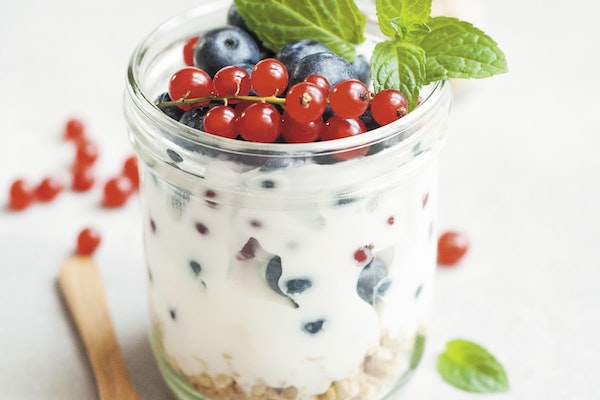
Can Muslim Eat Twizzlers?
When considering whether Twizzlers are halal or permissible for consumption by Muslims, it’s important to analyze the ingredients and the certification of the product.
In the provided list of ingredients, there are no explicitly haram (forbidden) substances listed, such as pork-derived gelatin or alcohol, which are common concerns in determining whether a product is halal. However, it’s crucial to emphasize that Twizzlers, as a product, and the company that manufactures them, do not hold an official halal certification.
Halal certification is a rigorous process that ensures all aspects of production, from ingredient sourcing to processing, packaging, and distribution, comply with Islamic dietary laws. This certification is typically issued by recognized halal certification bodies or authorities, like JAKIM in Malaysia or IFANCA in the United States.
Since there has been no official statement or certification from the Twizzlers manufacturer confirming that their production processes align with halal standards, a definitive halal status cannot be established. As a result, individuals who strictly adhere to halal dietary guidelines may choose to exercise caution and avoid Twizzlers until more information or certification becomes available.
In summary, while the ingredients listed do not contain obviously haram components, the absence of an official halal certification and a clear endorsement from the manufacturer creates a gray area in determining the halal status of Twizzlers. Therefore, Muslims who prioritize halal consumption may opt to wait for further clarification or choose alternative snacks with established halal certifications.
You can contact the manufacturer, The Hershey Company, to inquire about the halal status of their products, including Twizzlers. Here’s the link to their contact page: The Hershey Company Contact Page.
Feel free to reach out to them through this link to ask any specific questions or express your interest in halal-certified products. Your inquiries can help provide valuable feedback and potentially encourage them to consider halal certification for their products.
Here’s the link to their contact page: The Hershey Company Contact Page.
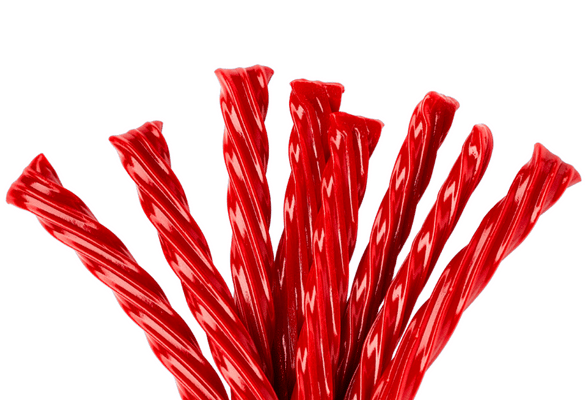
Ingredients
'TWIZZLER products are not halal certified.'
- Corn Syrup
- Enriched Wheat Flour
- Flour
- Niacin
- Ferrous Sulfate
- Thiamin Mononitrate
- Riboflavin
- Folic Acid
- Sugar
- Cornstarch
- Contains 2% or Less of:
- Palm Oil
- Salt
- Artificial Flavor
- Mono and Diglycerides
- Citric Acid
- Potassium Sorbate (PRESERVATIVE)
- Artificial Color
- Red 40
- Mineral Oil
- Lecithin
- Glycerin
There are some that may raise concerns for individuals seeking halal products. It's important to note that halal dietary restrictions can vary among individuals and religious authorities. Here's an analysis of the ingredients you provided:
- Corn Syrup: Generally considered halal.
- Enriched Wheat Flour: Generally considered halal, but it's essential to ensure it doesn't contain any additives or processing aids that are not halal.
- Sugar: Generally considered halal unless it's derived from a haram source or processed with haram ingredients.
- Palm Oil: Generally considered halal, but some individuals may have concerns about the sourcing and production of palm oil.
- Salt: Generally considered halal.
- Artificial Flavor: Generally considered halal unless derived from haram sources or processed with haram ingredients.
- Mono and Diglycerides: These emulsifiers are often derived from vegetable sources, but their halal status can depend on the source and processing methods. It's essential to verify their source.
- Citric Acid: Generally considered halal when derived from halal sources.
- Potassium Sorbate (Preservative): Generally considered halal.
- Artificial Color (Red 40): Halal status depends on the source of the colorant. Many artificial colors are halal, but some may be derived from haram sources.
- Mineral Oil: Generally considered halal.
- Lecithin: Usually derived from soybeans and considered halal unless derived from a haram source.
- Glycerin: Generally considered halal, but its source should be verified.

